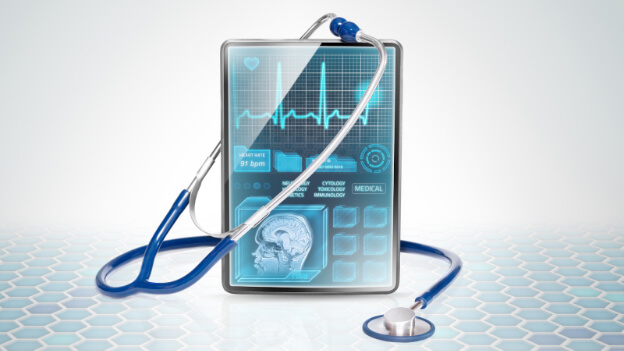 1-800-805-5783
1-800-805-5783 
COVID-19 made history in our lives and the healthcare industry. Digitization in healthcare has increased as users demand more advanced solutions for their healthcare requirements. Statistics highlight that telemedicine has significantly improved in the past few years, including remote doctor-patient consultation and remote patient monitoring.
As more users appreciate technological advancements, the demand for healthcare app development has become inevitable. Some surveys highlight that the mobile healthcare application industry will reach $300 billion by 2025. This means developing a mobile healthcare app can be the most significant investment.
Healthcare app development requires a complete setup and deep market analysis. If you’re considering creating a medical startup, this article is exclusively for you. Here, we will cover every aspect of healthcare app development, including its cost and benefits for doctors and patients.
Healthcare App Development Process
A healthcare app is designed to simplify the lives of doctors and patients. mHealth is a broader niche that includes a variety of mobile applications. Depending on your chosen app category, a mobile healthcare application may differ in purpose.
Steps for Building a Healthcare App
Healthcare app development is a complex process that differs from other apps in numerous ways. Follow the steps below to develop a healthcare app that will make your thorny path shorter and more accessible.
Do Through Market Research
Statista shows that more than 52,565 healthcare apps are available on the Google Play Store and 51,370 on the Apple App Store. This data-driven information indicates that you must put extra effort into making your app stand out. Research your niche and identify your competitors. Competitor analysis will help you determine your competitors’ strengths and weaknesses, which will help you beat the competition.
Prioritize Your Audience
When developing a healthcare app, you need to cater to the sensitivity of your audience’s problems. The user research phase is the most significant step of healthcare app development. This phase helps you understand the users’ problems and determine how your app can benefit your targeted audience.
Select an App Type
The next step is choosing a suitable app type. Numerous types of healthcare apps are available for professionals and patients.
Design mHealth App
Create an app design that can bring more value to users. A mHealth app should be intuitive and consistent, smoothly leading users to the endpoint. The fewer your app’s interaction points, the better user experience it will deliver.
Designing a healthcare app is the core phase, so focus on hiring a professional mHealth app development company.
Test Your App for Quality Assurance
Once your medical care app is developed, it’s vital to fix bugs and glitches that may hamper the user experience.

Healthcare App Development Cost
The ultimate cost of developing a mHealth app depends on the developers’ rates and the features you want to add. A simple healthcare app may take 800 to 1,000 hours to complete, whereas a complex app takes about 2,000 to 2,500 hours.
Here is a breakdown of healthcare app development costs depending on regions and complexity.
| Region | Cost with Simple Functionality | Cost with Advanced Functionality |
| Germany | $48,000 | $120,000 |
| UK | $44,000 | $110,000 |
| USA | $64,000 | $160,000 |
Healthcare Mobile App Types and Trends
Mobile app development has made the lives of patients and medical professionals much more manageable. Mobile app development has covered every aspect of the medical industry, from treatment monitoring and clinical documentation to maintaining health records. Healthcare mobile apps are divided into three broad categories:
Healthcare Apps for Professionals
As the name suggests, professional healthcare apps are centered around doctors. They are used as mediators in communication between a doctor and a patient. You can choose from the following types of professional healthcare apps:
The professional healthcare apps aim to help doctors interact more effectively with their patients and share health-improving tips with them.
Healthcare Apps for Patients
Healthcare apps for patients have gained massive penetration in the healthcare sector due to their instant availability and flexibility. You can find the following types of healthcare apps for patients:
Healthcare Apps for Medical Institutions

Healthcare Application Examples
To make your healthcare app more impactful, you must tailor it to your users’ requirements. You can get inspiration from the following healthcare applications:
Benefits of Healthcare Apps for Patients and Doctors
Medical apps benefit clinicians and patients through the quality of services and effective communication. Doctors, patients, and hospital staff highly appreciate these apps. Medical mobile applications can change the healthcare space in the following ways:
Best Practices and Features in Healthcare Apps
Your mobile medical apps must have the following features to give a more impactful impression to your audience:
The Bottom Line
Adopting the latest technologies, such as IoT and Artificial Intelligence, has opened new doors for healthcare app development. Developing a mHealth app can be a tedious process. Getting help from a trusted Mobile App Development Company can be ideal for creating a custom application.
Tags: Healthcare, mobile apps